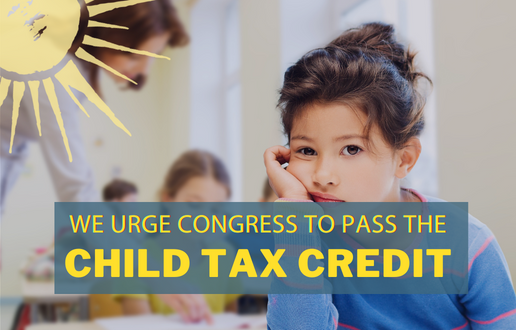
Congress Must Pass a Fully Refundable Child Tax Credit Before the New Year
Laura Peralta-Schulte, Senior Director of Public Policy and Government Relations
November 16, 2022
As the 117th Congress nears the end of its session, lawmakers are considering a short-term tax extender package to address expiring corporate tax breaks. NETWORK and our faith-based and secular partners believe it is poor policy, and morally repugnant, to extend tax breaks for well-heeled corporations without also enacting robust expansion of the Child Tax Credit (CTC). Congress must pass a fully refundable, monthly Child Tax Credit before the New Year.
Trickle-down policies favored by some politicians don’t work to provide low-income families the resources they need to live a dignified life. In fact, it leads to what Pope Francis has called the “idolatry of money” created by a culture of indifference to the excluded. Lawmakers have already proven that they can take action to substantially reduce child poverty and they must do again.
The American Rescue Plan (ARP) Child Tax Credit in December of 2021 lapsed in January 2022. The ARP Child Tax Credit significantly reduced child poverty to its lowest level ever. In the months since it ended, NETWORK and our partners have lobbied for legislation that reinstates a fully refundable, monthly Child Tax Credit. Child poverty, as measured by the supplemental poverty measure (SPM), declined to a historically low level of 5.2 percent in 2021—down from 9.7 percent in 2020—according to recently released data from the U.S. Census Bureau. This is powerful testimony to the effectiveness of the expanded Child Tax Credit.
The success of the 2021 expansion showed us that high child poverty rates are a policy choice, not an inevitability. In the congressional lame duck session, policymakers will have the opportunity once again to expand the Child Tax Credit, so that more families get help they need to afford the basics. ~ Center on Budget and Policy Priorities (CBPP)
Indeed, the expanded CTC provided a lifeline for families as the economy emerged from the economic downturn caused by the COVID-19 pandemic. Census Bureau surveys found that 91 percent of low-income families—those with incomes below $35,000—used their monthly CTC payments to cover the cost of basic necessities such as food, housing, utilities, clothing, and education to ensure that their children had healthier, stable environments.
The expanded CTC was also responsible for substantial reductions in Black and Hispanic child poverty, reducing the child poverty rate for both demographic groups by 6.3 percentage points. This translates to 716,000 fewer Black children and 1.2 million fewer Hispanic children in poverty, substantially narrowing persistent racial poverty gaps.
More action for the Common Good, Less partisan behavior
Why would lawmakers refuse to take steps toward ending child poverty with a robust expansion of the CTC when it has a proven track record of success? There should be no partisan debate about the merits of feeding hungry children or keeping families warm in the winter. Why are Republican legislators so keen to extend tax provisions for big business, but cold to the idea of expanding the child tax credit so all families get the credit regardless of income?
Friends, we must let Congress know that serving the common good is more worthy than being a master to corporate greed. With your advocacy, we can influence Congress to pass a fully refundable, monthly Child Tax Credit. Without our collective moral push, Congress may not prioritize children and families in need before this session ends.
While a few Senate Republicans have voiced support for improving the Child Tax Credit to help some low-income families, none are supportive of making the credit fully refundable. House Republicans launched an attack on the credit before the mid-term elections. They, and West Virginia Senator Joe Manchin, criticized the ARP Child Tax Credit as being too generous and made false claims that the credit reduced incentives to work. They are wrong! Data conclusively shows that the CTC did not precipitate workforce reductions. Ironically, many parents who thrived in the workforce when the CTC was in place have left jobs since it expired. Without the Child Tax Credit, they couldn’t afford the cost of child care and other essentials.
Congress Must Pass a Fully Refundable Child Tax Credit Before the New Year
Since checks to the low-income families ended in December of 2021, we have lost ground in the fight to end child poverty. A new study of families whose CTC payments ended on January 15, 2022 published by the Journal of the American Medical Association, found that food insufficiency increased by approximately 25 percent among families with children from January 2022 to July 2022. This finding is in stark contrast to JAMA’s previous study that showed a 26% decrease in food insufficiency among families with children in 2021 following implementation of the monthly CTC payments.
It is time to step up our advocacy efforts. We must remind our lawmakers that the choice this December is clear–invest in our most vulnerable families to help end child poverty. Perhaps with your advocacy and NETWORK’s lobbying, we can pressure lawmakers to prioritize ending child poverty. And remind them of the Christmas story: a child born to young parents struggling in poverty and left out in the cold.







